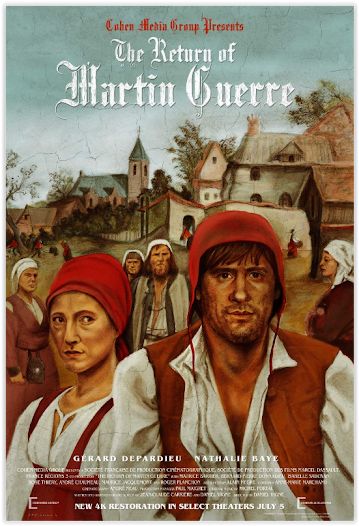Identity theft in 16th century France
Tuesday, September 13, 2022
If you think it’s easy for bad actors to commit identity theft today, just imagine how simple it might have been hundreds of years ago, before photographs or recorded media could be used to help verify the authenticity of a person suspected of standing in for someone else. That’s a major part of the dilemma at the heart of director Daniel Vigne’s The Return of Martin Guerre, a French period piece that depicts one of the most famous cases of imposture in history, starring Gerard Depardieu. The CineVerse faithful took a deep dive into this picture last week; here’s a recap of our talking points (warning: spoilers ahead; to listen to a recording of our group discussion, click here).
What did you find impressive, unanticipated, noteworthy, or distinctive about this film?
- The movie is well cast, boasting an array of skilled actors who imbue their parts with credibility and authenticity.
- Perhaps the story is that much more fascinating because it is introduced as a true one.
- The filmmakers don’t build intrigue by keeping the identity of Arnaud du Tilh secret until the end; there are hints that this man claiming to be Martin is a phony early on. Instead, we are enthralled more by the question of if and when he will be exposed and his deft ability to deceive the villagers.
- It straddles the line between different genres and subgenres, including a historical period drama, a courtroom drama, a folk tale, a romance, and a moral parable.
- Film Threat reviewer Hunter Lanier wrote: “There are many ways to tell this story. Vigne, very wisely, opts for all of them. As a result, you never feel confident as to what kind of movie you’re watching, which leaves you in the same state of confusion as the characters. In a similar fashion, Vigne doesn’t push the story into a particular thematic class but presents Martin, Bertrande, Pierre, and the townsfolk as lab rats in an experiment.”
Major themes
- A moral quandary: to embrace a more pleasing and amiable imposter or to accept the unlikable but authentic original.
- Considering how cold and uncaring the real Martin Guerre was to Bertrande, it’s not surprising that she would prefer the more attentive, literate, and popular charlatan over her real husband.
- It also makes sense that the uncle and the townspeople would bury their doubts and accept this prodigal version of Martin in their community, as he seems more affable, attractive, social, and hard-working.
- The parable of the prodigal son as a cautionary tale. The Bible story of the prodigal son teaches a lesson of forgiveness and love: that the father, or God, will welcome us back with open arms even if we have abandoned our family for years. But this cinematic twist on that tale suggests that there are risks in doing so blindly.
- Clever playacting and masquerading. Even though there isn’t much doubt about the real identity of the fake Martin, it’s fascinating to watch this imposter at work, particularly his acting and verbal talents at persuading others.
- The gullibility and naïveté of the masses. Arnaud’s ability to fool the relatives and friends of Martin speaks to how easily they can be persuaded and duped.
Similar works
- Sommersby, a 1993 remake
- Rashomon
- No Man of Her Own
- The House on Telegraph Hill
- The Chameleon
- The Affair of the Necklace
- Bernie
- The Imposter (2012 documentary)




